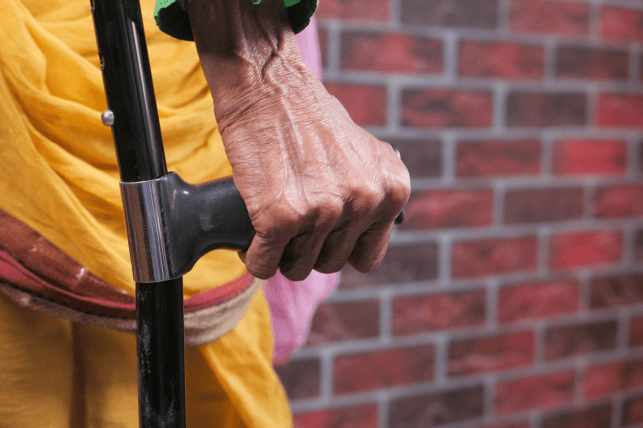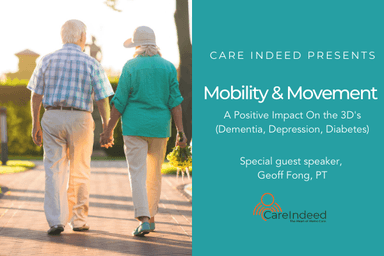
Why Aching Knees Are Worse Than A Broken Arm
Geoff Fong
Senior Caregiving
Mar 19, 2021
7 min read
If you were to compare developing stiff, achy knees to having a broken arm, which would you say is a bigger concern for your health? You might say breaking a bone is much worse. After all, it’s frightening, traumatic, and severely painful. With this in mind, how could there be ANY doubt as to why a fracture could ever be less harmful than moderately aching joints.
Well, consider this:
- Most people recover from a broken arm without surgery and have minimal impact on their daily function or quality of life years down the line but knee arthritis often leads to a progressive loss in function (1,2)
- The risk for developing knee arthritis is nearly TEN TIMES GREATER than that of having a proximal humeral fracture (3,4)
- Having knee arthritis increases the risk of falling which could, in turn, lead to a fracture (5).
While breaking an arm is clearly bad, studies show we’re much more likely to experience disability and chronic pain from knee arthritis. If chronic conditions are worse, why don’t we rush to the emergency room and scrabble for the first available PT appointment like we would probably do for a broken arm? The answer is pain. The short-lived, severe pain of the broken arm compels us to take action to resolve it ASAP whereas the moderate and long-term pain of arthritis often isn’t bad enough to act on until it REALLY gets bad enough and by then, it can be too late to improve without surgery and harmful medications.
There’s another issue with chronic, age-related conditions and it relies on how we view aging.
It’s my opinion that we dismiss chronic conditions as being unavoidable simply because research shows they are common in older people. How many of us half-jokingly tell friends “Ah, I’m just getting old” when talking about lingering pain or stiffness? If “old” people have chronic conditions, then chronic conditions must be part of growing old, right? And because the passage of time is beyond our control, it lends credence to the idea that the accumulation and progression of chronic health problems is also out of our hands.
How hard would you work against something that seemed completely unavoidable? Health decline through age can be incredibly oppressive. Like Gulliver being imprisoned by those tiny people during his travels, small things become more powerful in great numbers and many of us risk uncontrolled health decline from the issues we begrudgingly tolerate.
What if you could enjoy much better health, ability, and happiness through life simply by refusing to let nagging issues go unaddressed? What if your age and exact health circumstances matter less than your decision to take action and improve your health? Indeed, research shows that when people feel they can exert some control over their illness, they have better confidence in the treatment plan and are more likely to follow through successfully (6). When we change our mind about aging, we can change our trajectory.
My goal in writing today is not to tell you how to change your health, because everybody has different needs. No, my reason is ultimately to ask: would you take action to manage chronic conditions and, if so, seek help where needed?
Everybody has the potential to be healthier regardless of age and I wish you the best of results for yours in 2021.
References
1. Hsu H, Siwiec RM. Knee Osteoarthritis. [Updated 2020 Jun 29]. In: StatPearls [Internet]. Treasure Island (FL): StatPearls Publishing; 2021 Jan-. Available from: https://www.ncbi.nlm.nih.gov/books/NBK507884/
2. Kruithof RN, Formijne Jonkers HA, van der Ven DJC, van Olden GDJ, Timmers TK. Functional and quality of life outcome after non-operatively managed proximal humeral fractures. J Orthop Traumatol. 2017;18(4):423-430. doi:10.1007/s10195-017-0468-5
3. Cui, A., Li, H., Wang, D., Zhong, J., Chen, Y., & Lu, H. (2020). Global, regional prevalence, incidence and risk factors of knee osteoarthritis in population-based studies. EClinicalMedicine, 29-30, 100587. https://doi.org/10.1016/j.eclinm.2020.100587
4. Zachariasen, K., Dart, B. R., Ablah, E., Lightwine, K., & Haan, J. (2020). Proximal Humerus Fractures in the Elderly: Concomitant Fractures and Management. Kansas journal of medicine, 13, 101–105.
5. Arden, N. K., Crozier, S., Smith, H., Anderson, F., Edwards, C., Raphael, H., & Cooper, C. (2006). Knee pain, knee osteoarthritis, and the risk of fracture. Arthritis and rheumatism, 55(4), 610–615. https://doi.org/10.1002/art.22088
6. Shahin, W., Kennedy, G. A., & Stupans, I. (2019). The impact of personal and cultural beliefs on medication adherence of patients with chronic illnesses: a systematic review. Patient preference and adherence, 13, 1019–1035. https://doi.org/10.2147/PPA.S212046
Compassion and Kindness Are Needed to Support Those Affected by COVID-19

Latest Tips You Need to Know about the COVID-19 Vaccine




